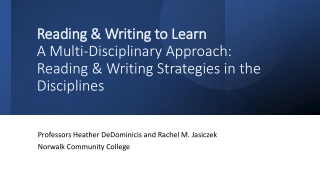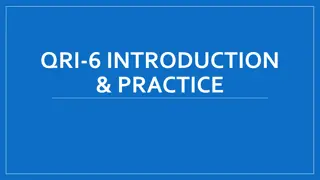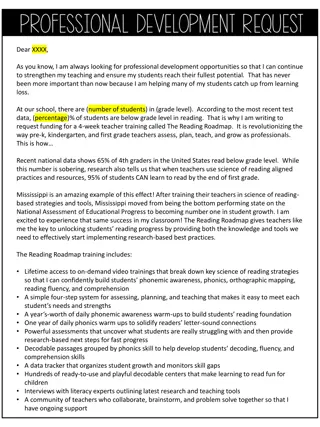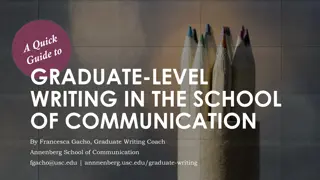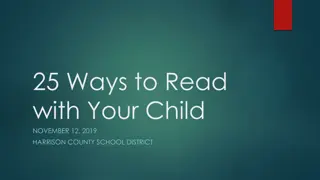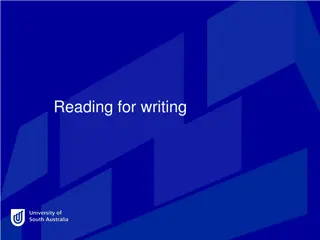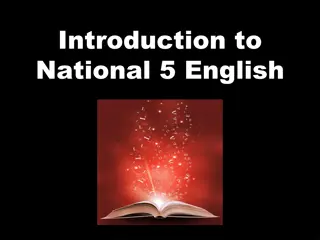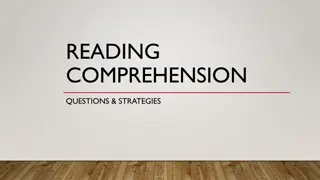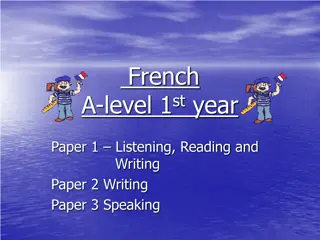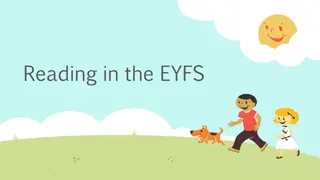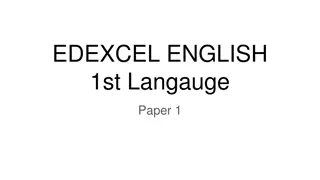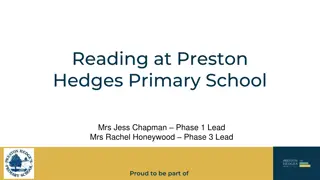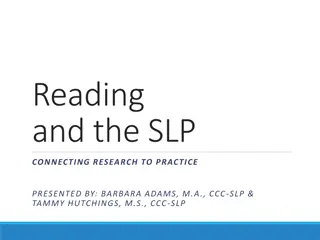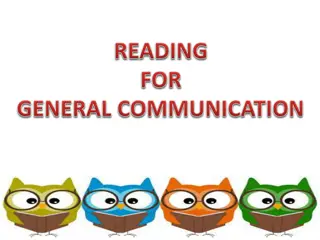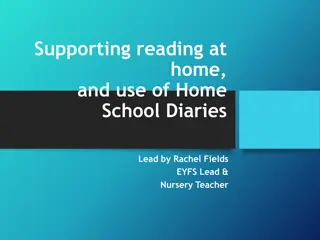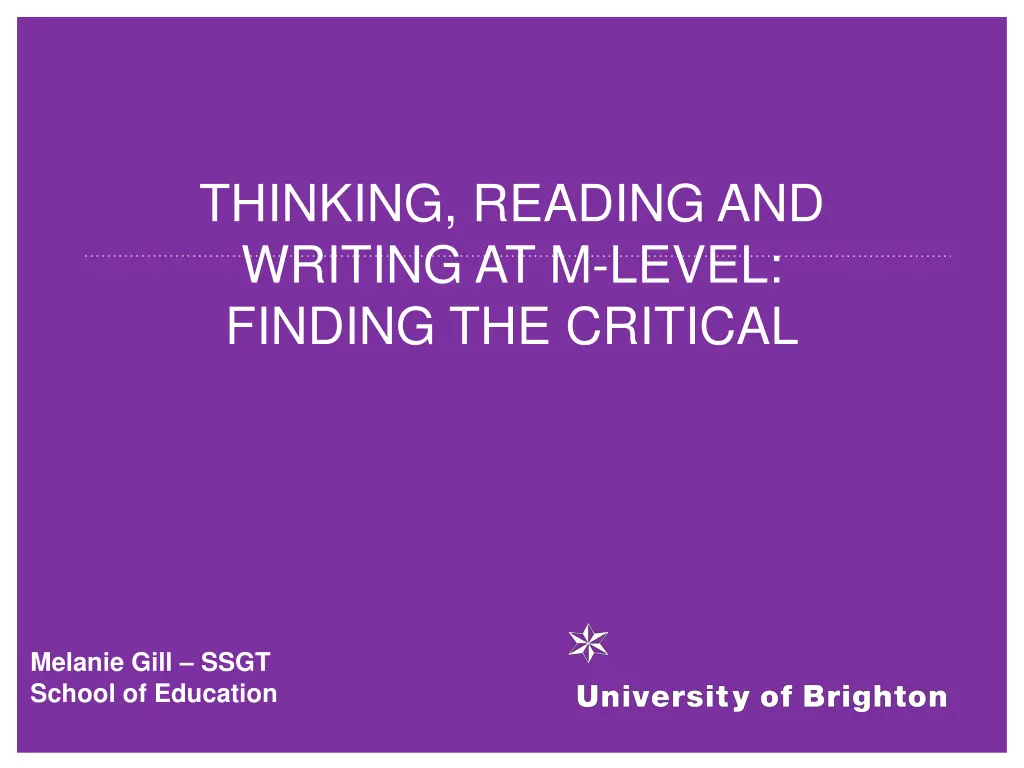
Developing Critical Thinking at M-Level: Unveiling the Power of Analysis and Synthesis
Explore the intricacies of M-Level thinking, reading, and writing with a focus on achieving criticality. Delve into the depths of critical stance development while enhancing cognitive skills, problem-solving techniques, and creative synthesis to align with SEEC levels. Understand the European Higher Education Area qualifications framework for bachelor's, master's, and doctoral degrees. Open your mind to new concepts and approaches for a transformative learning experience.
Download Presentation

Please find below an Image/Link to download the presentation.
The content on the website is provided AS IS for your information and personal use only. It may not be sold, licensed, or shared on other websites without obtaining consent from the author. If you encounter any issues during the download, it is possible that the publisher has removed the file from their server.
You are allowed to download the files provided on this website for personal or commercial use, subject to the condition that they are used lawfully. All files are the property of their respective owners.
The content on the website is provided AS IS for your information and personal use only. It may not be sold, licensed, or shared on other websites without obtaining consent from the author.
E N D
Presentation Transcript
THINKING, READING AND WRITING AT M-LEVEL: FINDING THE CRITICAL Melanie Gill SSGT School of Education
Session Overview What is M-Level? What is criticality and how do I achieve it? Developing a critical stance to thinking, reading and writing:.
SEEC Level 6 Knowledge & Understanding Has a systematic understanding of the knowledge base and its inter-relationship with other fields of study. Demonstrates current understanding of some specialist areas in depth. SEEC Level 7 Knowledge & Understanding Has a deep and systematic understanding within a specialised field of study and its interrelationship with other relevant disciplines. Cognitive skills Conceptualising and Critical Thinking Works with ideas at a level of abstraction, arguing from competing perspectives. Identifies the possibility of new concepts within existing knowledge frameworks and approaches. Cognitive skills Conceptualisation and Critical Thinking Uses ideas at a high level of abstraction. Develops critical responses to existing theoretical discourses, methodologies or practices and suggests new concepts or approaches. Problem Solving, Research & Enquiry Demonstrates confidence and flexibility in identifying and defining complex problems. Identifies, selects and uses investigative strategies and techniques to undertake a critical analysis, evaluating the outcomes. Problem Solving, Research & Enquiry Designs and undertakes substantial investigations to address significant areas of theory and/or practice. Selects appropriate advanced methodological approaches and critically evaluates their effectiveness. Synthesis and Creativity Flexibly and creatively applies knowledge in unfamiliar contexts, synthesises ideas or information in innovative ways, and generates transformative solutions. Synthesis and Creativity Applies knowledge in unfamiliar contexts, synthesising ideas or information to generate novel solutions. Achieves a body of work or practice that is coherent and resolved. Analysis and evaluation Analyses new, novel and/or abstract data using an appropriate range of established subject specific techniques. Judges the reliability, validity and significance of evidence to support conclusions and/or recommendations suggests reasons for contradictory data/results. Analysis and evaluation Undertakes analysis of complex, incomplete or contradictory evidence/data and judges the appropriateness of the enquiry methodologies used. Recognises and argues for alternatives approaches.
1st cycle: bachelor's degree 1stcycle: bachelor's degree 1st cycle: bachelor's degree 2nd cycle: master's degree 2ndcycle: master's degree 3rdcycle: doctoral degree 1st cycle: bachelor's degree 2nd cycle: master's degree 2nd cycle: master's degree Qualifications Framework of the European Higher Education Area (Bologna accords)
You will need to: read outside the module's core materials in order to get a broader perspective on your area of interest demonstrate academic judgement by gathering appropriate published evidence, which you then critically evaluate and use as the basis for logical argument and discussion on your area of focus gather your own data and consider its significance present your findings in a professional manner: as a written assignment, a dissertation, or an oral presentation to others.
What is it? ..perhaps Organising your thoughts and materials systematically to yield a coherent credible story (Learning Development, Plymouth University 2010) A questioning, challenging approach to perceived wisdom The ability to think about your own thinking in order to reconstruct Judge, Jones & McCreery (2009) Why do it ? Contributes to: Professional awareness Practice Self understanding ..pedagogy
What does it involve from thinker? Considering your own thinking .and getting in the habit of this Examining ideas from an objective position Questioning information in the light of your own values attitudes and personal philosophy The willingness to be open minded to the ideas and views of others The confidence to challenge and recognise the biases and prejudices in your own and others thinking Judge, Jones& McCreery (2009)
Model to Generate Critical Thinking Description Description Where? Who? When? How? What? What? Analysis Analysis Topic Topic Why? Why? What next? So what? So what? What if? Evaluation Evaluation Learning Development University of Plymouth
Questions worth asking yourself about reading Questions Does the information match my needs? Theme Relevance Look at the introduction or overview to check what it's about Provenance Don't be tempted to use information that may not have academic credibility Objectivity Look for an introduction or overview that describes affiliations or funding sources Timeliness Don't risk using obsolete evidence or data Presentation Look at language, layout and structure to check whether you can use it confidently Method Be aware of the differences in research methods Is it clear where the information has come from? Can I identify the authors or organisations responsible? How was it published? Has it been peer reviewed? Is the author's position or interest made clear? Does the author declare any connections that might compromise their independence? Is the language emotive? Are there hidden vested interests? Is it clear when the information was produced? Does the date of the information meet my requirements? Is the information clearly communicated? What research methods were used, and how are results reported? Do I need to check how significant the results actually are?
Reading at M-Level Hulse, B. & Hulme, R. (2012), Engaging with research through practitioner enquiry: the perceptions of beginning teachers on a postgraduate initial teacher education programme , Educational Action Research, 20(1) 313-329. What did you notice about the style / tone / voice of the writing? What did you notice about the structure of the article? How rigorous were the arguments? How do you know?
What is Critical Reading? Questioning any claims to knowledge (your own or others ) Scrutinising claims - how reliable and convincing are the author s arguments? Being open minded and open to other perspectives Being constructive seeking interpretations appropriate to your context
Questions for Critical Reading WHY? Why was the publication written?
Moving from Critical Reading to Critical Writing needs to be literate addresses the module outcomes and purpose contains evidence is critical explores implicit values contextualises pursues and presents an argument does not try to say everything is sensitive to the reader expresses your supported opinion http://www.doceo.co.uk/academic/m_writing.htm
Writing critically Descriptive writing - states what happened - states what something is like - gives the story so far - states the order in which things happened - explains what a theory says -explains how something works -notes the methods used -states opinions -states links between items - gives information Critical/analytical writing - identifies significance - evaluates/judges value, -weighs one piece of information against another - argues a case according to evidence -shows why something is relevant or suitable - explains reasons for selecting each option - indicates why something will work (best) -shows relevance of links -draws conclusions Adapted from Cottrell. S (2005) Critical Thinking Skills. Basingstoke, Palgrave Macmillan
References ASK Academic Study Kit: Advice for Post-graduate students http://about.brighton.ac.uk/ask/postgraduates/ http://www.leadgenix.com/wp-content/uploads/2013/10/twitter_logo1-Copy.png Cottrell. S (2005) Critical Thinking Skills. Basingstoke, Palgrave Macmillan. https://fbcdn-sphotos-b-a.akamaihd.net/hphotos-ak-xfp1/t31.0-8/1271084_10152203108461729_809245696_o.png?dl=1 Denby, N., Butroyd, R., Swift, H., Price, J. and Glazzard, J. (2008) Master s Level Study in Education; a guide to success for PGCE students. Maidenhead. Open University Press. Judge, B., Jones, P., & McCreery, E. (2009) Critical Thinking Skills for Education Students. Exeter. Learning Matters.

